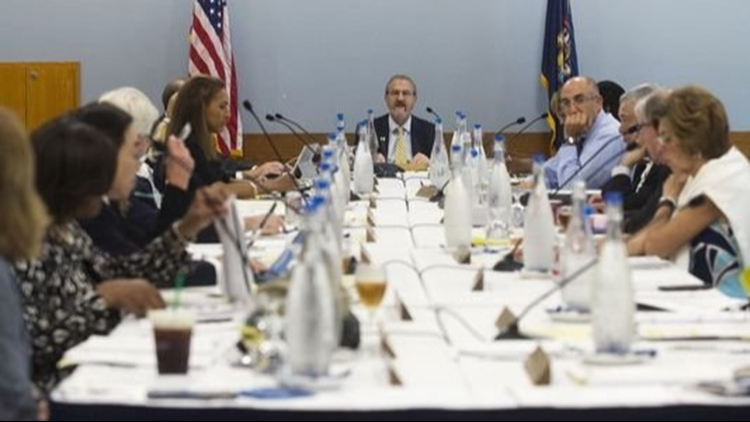The University of Michigan Board of Regents will be asked to strip the name of a former president who also advocated for eugenics from one of its science buildings.
U-M President Mark Schlissel is making the recommendation for getting rid of C.C. Little's name, which will be voted on by the board on Thursday, after a panel reviewed a petition from faculty and students calling for the change. Schlissel is also recommending the Alexander Winchell House in the West Quadrangle Residence Hall be renamed because of Winchell's racist views.
"CC Little is one of the most prominent buildings on campus," said U-M professor John Carson, who helped lead the petition to get Little's name off the building. "He is a figure that is controversial for a couple of reasons. It didn't seem to be a fitting name, especially for a science building."
The building is where U-M's main bus route interchange is located.
Eugenics is often defined as the science of improving a human population by controlled breeding to increase the occurrence of desirable heritable characteristics. It was advanced by the Nazis in Adolf Hitler's Germany.
Little was president of U-M from 1925 to 1929. He also served as the president of the American Eugenics Society. Unlike many scientists of his time who renounced their beliefs in eugenics in the late 1920s and 1930s, Little isn't known to have done so at any point in his life.
He also organized eugenic discussions and conferences while U-M president.
The panel said Little's career and beliefs made the move necessary.
"The central tenet is that in the areas of eugenics and tobacco smoking " ... [Little] lent his scientific (and University) prestige to public policy campaigns supposedly based in science ... whose scientific foundations were minimal, exaggerated, or actually contradicted by mainstream scientists or the contemporary scientific consensus," according to the written recommendation from Schlissel. "The committee emphasized that Little's support and participation in these campaigns had serious negative consequences noting that "his 1920s campaign for eugenic measures while University President — immigration restriction, sterilization of the "unfit," anti-miscegenation laws — and the 1950s campaign sowing doubt about the links between smoking and cancer negatively affected the lives of millions." Given these conclusions, the panel found it "particularly problematic that [Little's name] is on a building dedicated to science."
There were two public forums last year in which protesters called for Little's name to be removed. Protesters also held a number of marches from the building and routinely covered the building's name.
Schlissel's recommendation calls for the C.C. Little building to be known by its street address while a committee looks for a new name.
Little was 36 and the president of the University of Maine when he took over at U-M in September 1925. "He proposed establishing a 'University College' in which all students would be enrolled for their first two years," U-M's official president's history website says. "The faculty and deans were generally skeptical of the plan, leading to strained relations with Little" and he lacked the "tact and political skills" of previous presidents. Little resigned on June 29, 1929, and spent the rest of his time at a lab in Maine.
In his later career, he served as a defender of tobacco, talking for all his life, including in the 1960s, about how smoking didn't cause cancer, even after the Surgeon General had issued a report saying it did. Little's voice was heard in television commercials for tobacco companies making that argument.
The same panel also reviewed Winchell's case.
"At the heart of the committee's recommendation is their conclusion that by both contemporary standards and even in the context of Winchell's day, his most notable work (the 1880 book "Preadamites, or a Demonstration of the Existence of Men before Adam") was unambiguously racist and out of step with the University's own aspirations in those times as well,'" Schlissel wrote in his written recommendation to the board. "According to the committee, portions of this book continue to be used today to support white supremacist views, thereby amplifying the negative contemporary effect of the Winchell naming, especially on 'the actual building of communities' that we should aspire to in our residential housing."
►Make it easy to keep up to date with more stories like this. Download the WZZM 13 app now.
Have a news tip? Email news@wzzm13.com, visit our Facebook page or Twitter.



